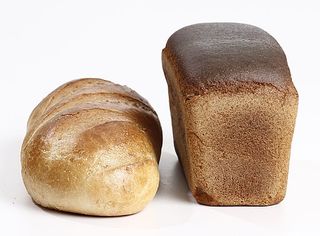Coronavirus Disease 2019
Bread and Cartwheels in the Coronavirus Pandemic
Fears of failure need to be reviewed—and replaced—in a time of introspection.
Posted April 19, 2020

I went to bed last night before 8:00, to avoid the thoughts that threatened me: the fear that I had been judgmental with one client, and that I had lacked wisdom with another when she sought direction. The threatening thoughts include other self-criticisms: my failure to make social telephone calls because I spend most of the day in telehealth and want to close my computer and throw away my phone every evening; my inability to maintain even a low standard of housekeeping with the coffee stains in Rorschach blots on the stairs, along with the collage of cat fur and kitty toys just out of reach on every step.
My fears of failure focus on the question: “How am I doing?” That makes sense at this time, when I am listening to my beloved clients, one after another, explore how they are doing—physically, emotionally, cognitively, and spiritually—in the midst of the coronavirus pandemic.
There are patterns in our current fears of failure: Anxiety mixes with gratitude; loneliness leads to moments of selflessness, often directed at me, with tender questions like “Do you need anything?” Or with gifts—mail-order chocolates, voice mails with prayers, uplifting memes. The increased emotional and spiritual intimacy in my therapeutic relationships is a boon, and I secretly gobble it up when no one’s looking. It allows me to say that I am doing all right, and to keep my threatening fears at bay.
But the biggest pattern I see in myself and my clients was expressed succinctly and poetically yesterday.
“I’ve been thinking about bread and cartwheels,” a client says at the beginning of our video session. I smile and sit back to listen.
This client lives with her aging parents and needs to provide more and more care for them. Her humor sustains her but her current pandemic circumstances—working from home, trying to keep the parents civil, safe, and well-fed, while maintaining her own sanity and sobriety—have been affecting even that well-honed coping mechanism. The humor has a bit more bite, and she’s a little slower to laugh at what she often can frame as parental antics and foibles.
“Mom made one more effort to teach me how to make yeast dough yesterday," she continues. "You know how at every holiday she tries to get me to make the rolls for the meal? How she stands by and watches me measure the ingredients, dissolve the yeast, mix and knead the dough? How she can never understand why, when I make it, it doesn’t rise? Never. It. Never. Rises. She says, each time, that I must be doing something wrong.” Although there is a smile and a shrug from her on the computer screen, there’s also pain and anger.

“Well, this time, when she wanted me to prepare the cinnamon rolls for my brothers’ breakfast, I told her about the cartwheels. The way my gym teacher, every single year from third grade through seventh, made me try again and again, every single day, to do a cartwheel. I couldn’t. I was really good on the balance beam. But I could not do a cartwheel. She’d encourage me every time—really nicely, with a lot of praise for effort. But every day in gym, during the gymnastics unit, I’d fail. Repeatedly. The other kids would stand and watch—and laugh. I could feel my whole body tighten. I ended up in tears every single day.” Her voice is distant, and I realize that her description has taken me back to elementary gym classes where I couldn’t catch a softball, climb a rope, or do a sit-up. We share the shame.
I wait to see what she will do with the feelings she is witnessing in her past.
“You know what Mom said?” I shake my head, hoping against hope that Mom was able to come through, able to comfort the humiliated little girl and the adult daughter as one.
“She was really angry, and said, ‘Fine! I just thought it would be helpful to figure out what you are doing wrong with the yeast! Never mind. I’ll make the rolls.’”
“No validation.”
She snorts. “No, of course not.”
“I’m glad you told her about the cartwheels. Even if it didn’t work to draw her into your feelings, it allowed you to see the connection.”
“Yeah. And she says she won’t try to teach me again.” A brief smile. “But she will. We’ve been through this before: I push back, she says she’ll stop, but the next holiday comes around and we fall back into her trying to teach me how to use yeast.” We both know the power of old dynamics, and she says, “I understand that she values the skill, and wants me to have it too—to be a good baker of yeast breads. But I’m not, and I don’t care. I’d rather be successful making delicious cookies.” A small laugh.
“Perhaps the insight—connecting the bread to the cartwheels—will help you avoid the old dynamic.”
She nods. “I did tell Mom to remind me not to allow myself to get involved in the next bread-making effort.”
“Maybe you can remember yourself,” I say with the gentleness I feel for the little girl in gym class. “Maybe you can look after yourself rather than your mother.”
She looks at me, eyes-to-eyes. “Sometimes I get lost.”
“I think you do pretty often, with all the caregiving you do in your work, and with your family, even with me.” (She’s one who has always checked in on how I’m doing, even before the pandemic.)
“And sometimes I think I don’t do things for myself because I have a fear of failure.”
We sit with that for a moment.
“That makes sense to me,” I comment. “In the bread-making, it is presented as your mistake, your not doing something right.”
“Yes, while I think it’s more that yeast simply doesn’t like me,” she says. We laugh, and I think about the times I’ve made bread and how much my emotional state either enlivens the yeast or shuts it down completely.
“Fear of failure,” I repeat. “Does it keep you from doing things you want to do?”
“Yes. Like sing.” I know that she has a beautiful voice and a love of singing, and that she can bring people to tears with her music.
I raise my eyebrows. “How come? I thought you know how good you are.”
She smiles wryly. “I know how good I can be. But I’m not always. My voice has changed. And I don’t like to make myself vulnerable. I don’t want to be one of those people who, when they sing, you think, ‘Oh please, just sit down.’”
“Do you really think anyone would think that?”
She pauses. “No, probably not. But I would be terribly hurt by any criticism.”
“It’s not worth the risk? The potential joy in performing? The awareness that you would give a lot of people pleasure?”
“I take care of a lot of people already,” she says, and I wince inside. Bad therapist!
“You need to keep yourself safe right now,” I observe.
“I guess,” she agrees.
I know that I usually am not a “bad therapist.” She knows that she can sing. She has no need to do a cartwheel. But in this time, the fears that come from childhood—her fears of rejection and humiliation, my fears of irresponsibility and mistakes—spring to the foreground as we spend more time confronting our humanity, with all its errors and pain, gifts, and hope.
Where do your fears of failure lie? Maybe this is the time to stop trying to do a cartwheel. Because maybe, if we relinquish cartwheels, we can let ourselves sing.





